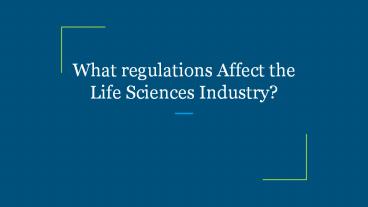What regulations Affect the Life Sciences Industry? - PowerPoint PPT Presentation
Title:
What regulations Affect the Life Sciences Industry?
Description:
Life sciences organizations need to address a broad range of industry-specific regulatory issues in addition to standard corporate governance, risk, and compliance demands. Regulatory compliance is a core part of life science industry, ensuring a competitive supply chain, promoting customer confidence and enabling profitable growth. – PowerPoint PPT presentation
Number of Views:34
Title: What regulations Affect the Life Sciences Industry?
1
What regulations Affect the Life Sciences
Industry?
2
- Life sciences organizations need to address a
broad range of industry-specific regulatory
issues in addition to standard corporate
governance, risk, and compliance demands.
Regulatory compliance is a core part of life
science industry, ensuring a competitive supply
chain, promoting customer confidence and enabling
profitable growth. - U.S. Food and Drug Administration (FDA)
- The United States Food and Drug Administration is
a public health agency that protects consumers by
enforcing the U.S. Federal Food, Drug, and
Cosmetic Act. The FDA regulates over 1 trillion
in products including
3
- Food for human and animal consumption.
- Pharmaceuticals consisting of ethical, generic,
and over-the-counter (OTC) drugs for human use,
as well as medicine for animals. - Biological and related products including blood,
vaccines, and biological therapeutics. - Medical devices
- Radiation emitting devices such as microwaves.
- Cosmetics
4
- The FDA monitors the manufacture, import,
transport, storage and sale of these products by
businesses that conduct business in the United
States. Compliance with FDA regulations has
become a market requirement. Failure to comply
can be very costly, not only due to expensive
recalls, but the FDA is empowered to even seek
criminal penalties against those who dont
comply. - FDA Regulation Title 21 Parts 210/211- Good
Manufacturing Practice (GMP) - GMP, sometimes referred to as cGMP, or current
Good Manufacturing Practice describes good
practices for the manufacturing of
pharmaceuticals. They are a set of regulations
specified by the FDA. They describe mechanisms
for the control and management of pharmaceutical
manufacturing processes, including, but not
limited to, quality control mechanisms.
5
- European Union GMP
- Similar to the regulations put forth by the FDA,
the European Medicines Agency, part of the EU,
has passed regulatory requirements (Annexures 11,
13, 14, 16, and 18) that also cover computerized
systems for the life sciences industry,
manufacture of medical products, and
certification of products to be released. - Regulatory Challenges for Life Sciences
- Electronic Records and Signatures
- SAP solutions provide the functionality required
to comply with the following regulations and
guidelines related to electronic health records
and signatory capabilities.
6
- EU Commission Directive 2003/94/EC (EU GMP
Guideline) - This directive specifies legal requirements for
good manufacturing practice (GMP) in the European
Union (EU). It requires that data be available at
the proper time, provided in a readable form, and
protected against damage or loss. - ICH Q7A, Q8, Q9 Guidelines
- International Conference on Harmonization (ICH)
of Technical Requirements for Registration of
Pharmaceuticals for Human Use Q7A provides
guidelines for active pharmaceutical ingredients
in the EU, the United States, and Japan. Q8
provides guidance on pharmaceutical development
and Q9 covers quality risk management for all
aspects of pharmaceutical production.
7
- PIC/S
- The Pharmaceutical Inspection Convention and
Pharmaceutical Inspection Cooperation Scheme
(PIC/S) develops and promotes harmonized GMP
standards and guidance documents training
competent authorities, in particular inspectors
assessing (and reassessing) inspectorates and
facilitating the co-operation and networking for
competent authorities and international
organizations.
8
- FDA Regulation Title 21 CFR Part 11 Electronic
records, Electronic Signatures - This U.S. FDA regulation establishes requirements
for electronic records systems, regulating the
use of computer systems, audit trails, lot and
serial traceability, change control, archiving,
e-signatures, and security. - Radio Frequency Identification (RFID)
- SAP solutions provide the functionality required
to comply with the following regulations and
guidelines related to radio frequency
identification (RFID).
9
- FDA Bar Code Label Requirements for Human Drug
Products and Biological Products - Specifies the FDA rules and requirements for bar
codes on most prescription drugs and certain
over-the-counter drugs. - Procedure for Handling Rapid Alerts and Recalls
Arising from Quality Defects - The European Commission has established
procedures for the rapid transmission of
information related to pharmaceutical recalls.
10
- Radiofrequency Identification Feasibility Studies
and Pilot Programs for Drugs - This FDA Compliance Policy Guide describes how
the FDA intends to enforce regulations related to
labeling, electronic records, and product quality
for pharmaceutical manufacturers, re-packers,
re-labelers, distributors, and retailers. - US State Regulations There are a number of US
states that have established or are establishing
mandates that require pharmaceutical wholesalers
and distributors to maintain pedigrees for every
drug shipped within their borders. Florida is one
of the states developing such legislation.
11
- Agile Scientific is a life sciences organization
that brings decades of industry knowledge,
expertise, processes, best practices, and systems
to companies. Agile Scientifics clinical
services function to accelerate all facets of
drug development, ensure compliance at a global
level and optimize pipeline value / ROI. Agile
Scientific Group LLC is fortunate to partner with
smaller virtual organizations and Fortune 500
Life Sciences companies alike. We have extensive
experience providing focused, pragmatic clinical
solutions to our sponsor Life Science
organizations and CROs across all areas of Drug
Safety, Regulatory Affairs, HEOR /
Pharmacoepidemiology, Quality Assurance.































